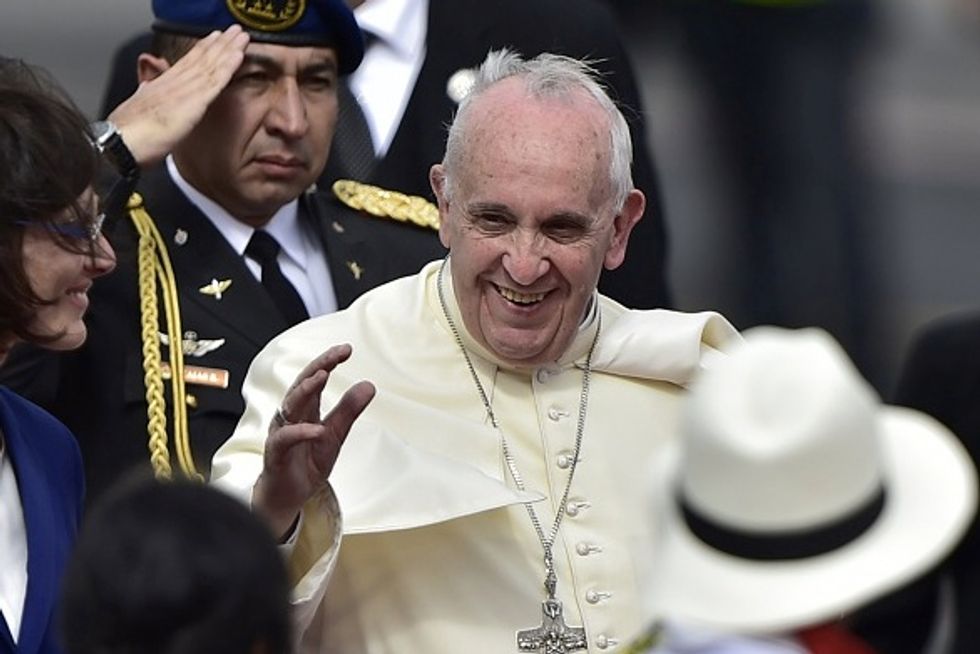
Pope Francis listens to a speech during a special audience he held for members of the FOCSIV Italian Catholic volunteers, at the Vatican, Thursday, Dec. 4, 2014. (AP Photo/Andrew Medichini)

VATICAN CITY (TheBlaze/AP) -- In his latest move that is capturing international attention, Pope Francis radically reformed the Catholic Church's process for annulling marriages Tuesday, in an effort to speed up, simplify and lower the cost of the oft-times complex procedure.
After an expert group was assembled to study how marriage law is handled in the church, Francis issued a new law regulating how bishops around the world determine when a fundamental flaw has made a marriage invalid.
There were three main changes that were implemented: the removal of a second review before a marriage can be annulled, allowing bishops to fast-track and grant annulments themselves in certain situations, and ensuring that the process is free of charge — aside from small administrative fees, CNN reported.

Catholics must get an annulment if they want to remarry in the church. Without one, those who divorce and remarry outside of the Catholic Church are considered to be living in adultery and sin and are, thus, forbidden from receiving communion.
The annulment process has long been criticized for being complicated, costly and out of reach for many Catholics, especially in poor countries where dioceses don't have marriage tribunals.
Pope Francis made it clear that the changes were not about making marriages easier to dissolve, proclaiming in the document that the changes are meant to simply speed up the process to that Catholics can find justice.
The overall aim of the reform, he said, "is the salvation of souls."
The biggest reform involves a new fast-track procedure, handled by a bishop, that can be used when both spouses request an annulment or don't oppose it. It can also be used when other proof makes a more drawn out investigation unnecessary. It calls for the process to be completed within 45 days.
Another reform is the removal of the automatic appeal after the first decision is made. Appeals are still possible, but they are no longer automatic — a simplification that has been used in the United States for many years.
The reform also allows the local bishop, in places where a three-judge tribunal isn't available, to be the judge himself or to delegate the handling of the cases to a single priest-judge with two assistants.
That measure is aimed at providing Catholic couples with recourse to annulments in poorer parts of the world, or places where the Catholic Church doesn't have the resources or manpower to have fully functioning tribunals.
Francis also called for the fees to be waived, except for the "just" payment of tribunal personnel.
Catholics have long complained that it can take years to get an annulment, if they can get one at all. Costs can reach into the hundreds or thousands of dollars for legal and tribunal fees.
Francis had already called for annulments to be free, saying all Catholics have the right to justice from the church. He has also said the church should take into account that ignorance of the faith can be a reason to declare a marriage invalid.
Francis has previously quoted his predecessor as Buenos Aires archbishop as saying half of the marriages that are celebrated are essentially invalid because people enter into them not realizing that matrimony is a lifelong commitment.
 Pope Francis listens to a speech during a special audience he held for members of the FOCSIV Italian Catholic volunteers, at the Vatican, Thursday, Dec. 4, 2014. (AP Photo/Andrew Medichini)
Pope Francis listens to a speech during a special audience he held for members of the FOCSIV Italian Catholic volunteers, at the Vatican, Thursday, Dec. 4, 2014. (AP Photo/Andrew Medichini)
Norms attached to the new law say that the "lack of faith" can be a cause for an annulment.
These annulment amendments will go into effect on December 8, the start of Pope Francis' Holy Year of Mercy, which runs through Nov. 20, 2016.
As TheBlaze previously reported, during that same timeframe women who have had an abortion and those who have assisted them can be forgiven by all priests so long as they confess to their actions. This marks a notable change, considering that excommunication was automatic for the “sin of abortion.”
While annulment changes are seemingly permanent, the abortion policy change will last only throughout the Holy Year of Mercy.
Follow the author of this story on Twitter and Facebook:
Billy Hallowell